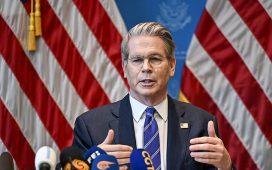Stay informed with free updates
Simply sign up to the US financial regulation myFT Digest — delivered directly to your inbox.
Republican lawmakers are planning to shut down the US audit regulator, which was founded in the wake of the Enron scandal more than two decades ago, as part of a reform package designed to deliver Donald Trump’s deregulatory agenda.
The proposal to eliminate the independent Public Company Accounting Oversight Board was published late on Friday by the leadership of the House Committee on Financial Services, for inclusion in the giant tax and spending bill being considered by Congress.
Under the draft legislation, a levy on listed companies and broker-dealers that funds the PCAOB would be scrapped and the organisation’s responsibilities would be folded into the Securities and Exchange Commission.
The PCAOB was set up to oversee audit standards and conduct regular inspections of firms that audit US public companies after the collapse of Enron in 2001 exposed shortcomings in the previous self-regulatory regime.
Accounting firms have chafed against the activist leadership of chair Erica Williams, under whom the agency imposed tough new standards and extracted record fines in enforcement actions.
Any effort to eliminate the agency is likely to meet resistance from Democrats and may not receive the full endorsement of audit firms.
The Center for Audit Quality, which represents the largest firms, has called for the agency to be more responsive to accounting firms, but has previously stopped short of calling for its elimination.
While PCAOB employees could be given the chance to transfer their roles to the SEC, they would in many cases have to take pay cuts as the organisation is not subject to government pay scales.
Critics have argued that such a move would substantially disrupt the audit-firm inspection regime.
But Christina Ho, a PCAOB board member who has opposed several of Williams’s signature initiatives, said that SEC salaries could be higher than those in many government agencies. “The SEC has not had difficulty attracting and retaining talent,” she said.
The committee’s draft legislation also scraps any unallocated funds under a $1bn green retrofitting programme for housing brought under the Inflation Reduction Act, Joe Biden’s landmark climate legislation, and slashes the budget of the Consumer Financial Protection Bureau.
It faces procedural hurdles, however. The full House Committee on Financial Services will consider the legislation in the coming days, but whether it will be included in the tax and spending bill, known as a reconciliation bill, will depend on negotiations within the Republican leadership in the House and Senate and whether it is deemed a budgetary measure.
Sandy Peters, head of global advocacy at the CFA Institute, a professional body for investors, said the creation of the PCAOB led to dramatic improvements in audit quality.
“The largest and most efficient capital markets need a strong, apolitical and independent audit regulator and accounting standard setter,” she said. “If capital formation is a priority for the administration, this disrupts that.”










